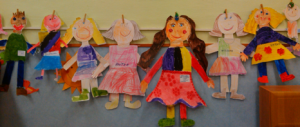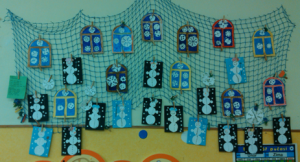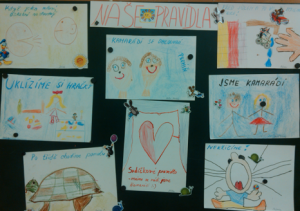What is important when communicating with a pre-schooler by Monika Janáková
An interview with a pre-school-aged child offers an extraordinary opportunity for child development, although good communication skills are required. Children’snatural behaviour as they discover the world around them often forces us to intervene in their spontaneous actions. When responsible for children, we tend to communicate in a very straightforward way in order to deal quickly with certain situations.
Making precise demands on a child’s behaviour leads to a quick and efficient result at a particular moment. Generally speaking, children are used to obeying commands given by parents or teachers, such as “Clean up your t oys!”, “Wash your hands!” and “Don’t be mean!” – all very common as immediate reactions on the part of teachers and parents to daily issues in the education of children. Consequently, however, a lack of deeper understanding leads to dependence on decisions made by adults instead of allowing a child to develop reasoning skills.
oys!”, “Wash your hands!” and “Don’t be mean!” – all very common as immediate reactions on the part of teachers and parents to daily issues in the education of children. Consequently, however, a lack of deeper understanding leads to dependence on decisions made by adults instead of allowing a child to develop reasoning skills.
 In contrast, “Help me do it myself”, the well-known words of Maria Montessori, illustratean approach we can apply in communication with pre-school children. In other words, as parents or teachers, it is our task to help children understand relations in the world around them. In order to provide children with appropriate information without giving them a precise idea of what should be done, such questions and descriptions can be used: “There are lots of toys on the ground. So there is no room for another game.”;“I can see your hands are dirty”; “I can see she is crying. What happened?”
In contrast, “Help me do it myself”, the well-known words of Maria Montessori, illustratean approach we can apply in communication with pre-school children. In other words, as parents or teachers, it is our task to help children understand relations in the world around them. In order to provide children with appropriate information without giving them a precise idea of what should be done, such questions and descriptions can be used: “There are lots of toys on the ground. So there is no room for another game.”;“I can see your hands are dirty”; “I can see she is crying. What happened?”
These impulses force the child to think about reasons, connections and solutions for situations. Additionally, when asking a question, the child’s opinion is expected, which serves to develop communication skills. As a result, understanding of certain habits, principles and values is deepened and acquired gradually, providing children with valuable experience that informs their other actions.
 To summarize, communication among children and their parents or teachers can vary from very concrete commands with a quick and efficient short-term result to questions and description helping children deepen their knowledge and understanding of interconnection in the world. What is going to be your way of communication with children?
To summarize, communication among children and their parents or teachers can vary from very concrete commands with a quick and efficient short-term result to questions and description helping children deepen their knowledge and understanding of interconnection in the world. What is going to be your way of communication with children?